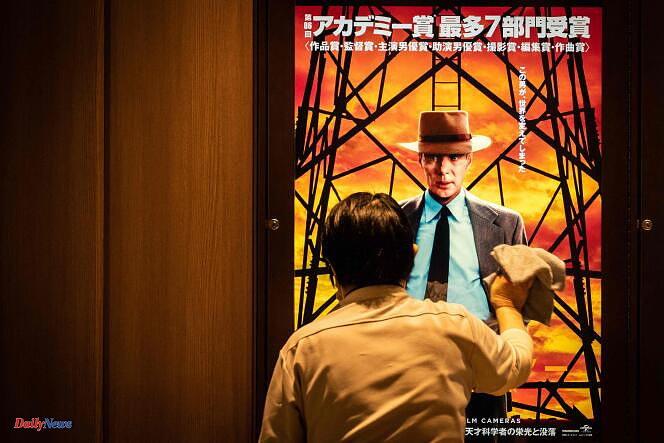A film awaited and feared by the Japanese. The film Oppenheimer, by Christopher Nolan, was released in Japanese theaters on Friday March 29. Dedicated to the American physicist Robert Oppenheimer, father of the atomic bomb, the three-hour feature film was a huge success around the world. It also won seven statuettes at the last Oscar ceremony, including those for best film and best director.
The feature film was released in many countries in the summer of 2023 at the same time as another blockbuster, Greta Gerwig's joyful comedy Barbie, sparking countless memes on the Internet on this occasion. Images combining the two films shocked public opinion in Japan, the only country to have been struck by atomic weapons in August 1945, during the Second World War. More than 214,000 people were killed following the dropping of atomic bombs on the cities of Hiroshima and Nagasaki.
In Japan, it was therefore necessary to wait almost eight months for the film to be screened. No official reason has been given for the delay, fueling speculation that the film was too sensitive to release in the country.
An “America-centric” film
In early March, a preview screening of the film was held in the city of Hiroshima to gauge public reaction before its official release. The former mayor of Hiroshima Takashi Hiraoka spoke on this occasion. “From Hiroshima’s point of view, the horror of nuclear weapons has not been sufficiently described,” he lamented, reports the Japanese media Asahi Shimbun. “The film was made in such a way as to validate the conclusion that the atomic bomb was used to save American lives. »
Another Hiroshima resident, Kyoko Heya, interviewed by Agence France-Presse (AFP), also felt that the film was "very America-centric" but nevertheless hoped "that a lot of people would watch [it] » in order to initiate discussions on atomic weapons.
Toshiyuki Mimaki, president of a victims' association and who survived the bombing of Hiroshima when he was 3 years old, regretted to the Associated Press (AP) that the consequences of atomic weapons on the ground were not were not addressed: “Throughout the entire film, I waited and waited for the Hiroshima bombing scene to happen, but it never happened,” he said.
Absence of images of the victims
Oppenheimer does not describe the devastation of the two bombs, which instantly killed some 100,000 people before causing the deaths of thousands more, mostly civilians, in the days that followed in the two Japanese cities. The film focuses on the character of Robert Oppenheimer, his journey and his internal conflicts.
The film was also previewed in Nagasaki, where Masao Tomonaga, 80, another hibakusha (bomb survivor), said he was impressed by the film. “I had thought that the absence of images of atomic bomb survivors was a weakness,” Mr. Tomonaga, who was 2 at the time of the bombing and later became a researcher, told AFP to study leukemia caused by radiation. “But in fact, Oppenheimer’s statements in dozens of scenes show the shock he felt at the reality of the atomic bombing. That was enough for me,” he added.
The broadcast of Oppenheimer may also be an opportunity for Japanese directors to reappropriate this story. This is the wish of Takashi Yamazaki, director of Godzilla Minus One - Oscar for best visual effects in 2024 - which also evokes the appearance of nuclear weapons. In this film, Mr. Yamazaki makes the latter a fantastic object, responsible for the appearance of kaiju (“monster” in Japanese). “I think there needs to be a response from Japan to Oppenheimer. One day I would like to make this film,” he said in an online exchange with Christopher Nolan as quoted by AP.
The Martyrdom of Hiroshima was brought to the screen with Hiroshima, mon amour, by director Alain Cavalier, a Franco-Japanese co-production with a screenplay by Marguerite Duras. The film was presented at the Cannes Film Festival in 1959, but was excluded from competition due to American pressure.












